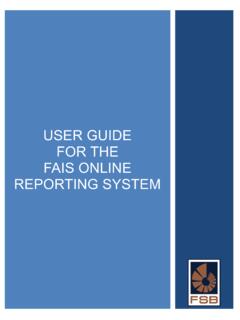Transcription of The Financial Advisory and Intermediary Services (FAIS) Act
1 The Financial Advisory and Intermediary Services ( fais ) Act The Aim of the fais Legislation It is important to bear in mind, when seeing fais in context with other pieces of legislation, that what it really creates or aims to create is a formal system of regulating Financial advisors and intermediaries. As a result of this, aggrieved consumers will be able to seek redress when they have been misled or misrepresented to by a representative or Financial Services provider. It appears that in recent times, compliance and consumer protection have become buzzwords in the Financial Services industry and certainly fais is not the first piece of legislation in this industry to concern itself with the rights of consumers. Other pieces of legislation include the Long and Short Term Insurance Act more specifically, the Policyholder Protection Rules The Financial Markets Control Act and the Stock Exchanges Control Act.
2 So in a nutshell, different pieces of legislation are enacted with different aims in mind. The fais legislation has been enacted with a strong emphasis on consumer protection and aims to achieve effective regulation of the different role-players through a number of mechanisms: Financial Services Providers (FSP s) will have to be licensed in terms of the Act and they will have to comply with certain prescribed fit and proper criteria. The FSP s are responsible for their representatives who also have to comply with fit and proper requirements. Further, the Act lays down standards for the market conduct of both FSP s and representatives. Again, the focus here is on the consumer to receive fair treatment and to have full disclosure made to the consumer. Why the Need for the fais Legislation? The fais Act was introduced to regulate the business of all Financial Service Providers who give advice or provide Intermediary Services to clients, regarding a wide range of Financial products.
3 In terms of the Act, such Financial Services Providers need to be licensed, and professional conduct is controlled through Codes of Conduct and enforcement measures. The Act aims to achieve the following: Professional Conduct Better informed clients, and A professional, responsible sector What is the history behind the legislation? Historically, there has been no formal system of regulating Financial advisors and intermediaries. Aggrieved clients had very little recourse against dishonest advisors. Further, processes to protect clients such as Complaints policies and record keeping systems were not formally regulated. The Board for Financial Services and Regulation was responsible for conceptualizing and designing the basic framework which would become fais . The fais Bill (before it was enacted) was drafted on the basis of a framework of specifications (provided by the Policy Board for Financial Services and Regulation), which only covered the furnishing of advice.
4 Since then, the ambit of the Bill has been extended to all Intermediary Services rendered in respect of Financial products (as defined in the legislation) and now has more far-reaching implications. During the drafting process (which lasted for more than 2 years), several drafts of the Bill were put on the Financial Services Board s (FSB) website, followed by statements in the media, inviting comments. In addition to this, and given the fact that the Bill attracted interest from all the different industry players within the Financial Services sector, a number of workshops, as well as several road shows, were hosted by the FSB. These events covered discussions around the contents of the then Bill and its possible impact on the industry. How does fais Address the Issue that there are Different Pieces of Legislation which Apply to Different Sectors of the Industry?
5 The Act has a FUNCTIONAL and not an INSTITUTIONAL approach in its design. Since it regulates a FUNCTION, and not an INSTITUTION or group of institutions, it is not restrictive as to what institution it applies to. The applicability of the Act to an organisation depends on the following: If a person performs the function of advice ; or Intermediary service Definition of ADVICE and Intermediary SERVICE These definitions are broad and all-inclusive and apply to a wide range of sectors within the industry. Advice is defined as any recommendation, guidance or proposal of a Financial nature furnished, by any means or medium, to a client or group of clients in respect of the purchase or investment in any Financial product, the conclusion of any other transaction aimed at incurring any right or benefit or liability in respect of any Financial product (this includes a loan or cession), or the variation, replacement or termination of any Financial product.
6 Intermediary Service means any activity other than the furnishing of advice that is performed by a person for or on behalf of a client or product supplier. In addition, in each instance, the advice or Intermediary service must relate to a Financial product which has a wide implication in terms of its definition. Who or what is a Financial Services Provider (FSP)? In terms of the Act, an FSP is defined as any person, other than a representative, who as a regular feature of the business of such person furnishes advice, or renders any Intermediary service, or both. This could be an entity such as a large corporate who is also a product supplier or even an independent brokerage who operates as an SMME (Small, medium, micro enterprise). However, in terms of section 7 of fais , no person (including juristic persons) will be able to act as an FSP, unless such person has been issued with a licence by the Registrar.
7 In its application to become an authorised FSP, all relevant parties details must be disclosed. For example, Key Individuals, Representatives, and details about the FSP itself. A licence may be granted subject to certain conditions and/or restrictions which results in categorisation of FSP s according to the type and level of service rendered. Key individuals These are natural persons within the FSP who are either managing or overseeing the activities of the FSP relating to Financial Services (for example a manager of a distribution unit in an FSP). Representatives These are the persons who render a Financial service to clients for or on behalf of an FSP, in terms of an employment or any other mandatory agreement. An example of a representative would be a tied agent of a large corporate or a Financial advisor who operates under the auspices of an independent brokerage.
8 Support staff These are the staff that supports the function of the sales staff within the administrative functions of an FSP. FSP s and their Representatives In terms of fais , a person will not be able to act as a representative of an authorised FSP, unless such person is able to provide confirmation, certified by the FSP, to clients that: A service contract or other mandatory agreement, to represent the FSP exists The FSP accepts responsibility for the activities of the representatives falling within the contract or mandate. The Act makes the FSP s liable for the conduct of their representatives. In terms of the Act, a representative engages in the same activities as its principal but does so for and on behalf of the FSP. This relationship is either based on the fact that the representative is an employee of the FSP or holds a mandate from the FSP.
9 The FSP is expected to provide an updated register of its representatives to the Financial Services Board. It therefore stands to reason that before an insurer mandates an organisation to perform certain functions on its behalf, it must ensure that such organisation is a registered FSP. This will mean that each FSP takes responsibility for its own employees or representatives, and the insurer is not held accountable for the behaviour of other organisations that perform certain functions on its behalf. Further, the Act is quite clear on the duties of the FSP regarding its representatives. An authorised Financial Services provider must: (a) at all times be satisfied that the provider's representatives, and key individuals of such representatives, are, when rendering a Financial service on behalf of the provider, competent to act, taking into consideration requirements similar to those contemplated in paragraphs (a) and (b) of section 8(1) and subsection (1)(b)(ii) of this section, where applicable; and (b) take such steps as may be reasonable in the circumstances to ensure that representatives comply with any applicable code of conduct as well as with other applicable laws on conduct of business.
10 Every authorised Financial Services provider must maintain a register of representatives, and key individuals of such representatives, which must be regularly updated and be available to the Registrar for reference or inspection purposes. Such register must contain every representative's or key individual's name and business address, and state whether the representative acts for the provider as employee or as mandatory. The register must also specify the categories in which such representatives are competent to render Financial Services . It should be quite clear that the relationship between the FSP and its representatives is governed by a service contract or other mandatory agreement, and the FSP must accept responsibility for the activities of the representatives falling within the contract or mandate. For example In the hypothetical case of ABC Brokerage (Pty) Ltd, with four Financial advisors, the brokerage will be the FSP and the advisors, the representatives.










